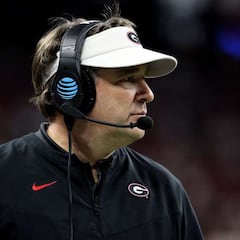What violations did Tennessee football’s former coach Jeremy Pruitt commit?
Though the allegations against him and his staff are severe, the university gave its full cooperation in the investigation, resulting in a transparent and thorough process.


With the investigation now concluded and the coach at the center of it all sanctioned, the entire scenario has shed light on a less than transparent aspect of the college game.
Tennessee’s Jeremy Pruitt facing 18 sanctions
According to reports, former Tennessee football coach Jeremy Pruitt, his wife and several members of his football staff are now facing 18 separate allegations of recruiting misconduct. As per a 51-page ‘notice of allegations’ sent to the school on Friday, it is understood that Pruitt and Co. provided approximately $60,000 of impermissible benefits and recruiting inducements to more than two dozen recruits and their families over a three-year period.
Former Tennessee football coach Jeremy Pruitt, his wife and several staff members provided about $60,000 of impermissible benefits and recruiting inducements to more than two dozen recruits and their families over a three-year period, per @RossDellenger: https://t.co/ZFycod6V8Y pic.twitter.com/CBNoaQwWF3
— Sports Illustrated (@SInow) July 22, 2022
The notice goes on to explain that as early as September 2018, his 10th month on the job, Pruitt and his staff were engaging in blatant misconduct and even continued to do so through the covid-19 recruiting dead period of 2020. To be clear all allegations against Pruitt are Level I, the most severe on the NCAA’s infractions scale. As for the most serious of the allegations themselves, it is understood that Pruitt, along with his staff, hosted at least six different prospects and their families on nine separate unofficial weekend visits during the year long dead period. In addition, prospects and their families were provided with accommodation, meals, transportation, household goods and even furniture that totaled some $12,000. Pruitt himself is alleged to and subsequently charged with having made cash payments of $3,000 and $6,000 to two prospects’ mothers for the purpose of assisting with medical bills and a down payment on a vehicle.
Who are the others implicated in Jeremy Pruitt’s case?
Aside from Pruitt, there were a total of seven staff members who were also charged with committing violations and subsequently fired in January of 2021 after an internal investigation was conducted by the University. Those fired were: defensive coordinator Derrick Ansley, outside linebackers coach Shelton Felton, inside linebackers coach Brian Niedermeyer, director of player personnel Drew Hughes, director of recruiting Bethany Gunn, assistant director of recruiting Chantryce Boone and a student assistant whose name is redacted from the report. Interestingly, the ninth person charged with violations was Pruitt’s wife, Casey who allegedly made cash payments of at least $13,000 to recruits and their families.
Jeremy Pruitt Had His Wife Handing Out Payments To Recruits, According to NCAA Documents https://t.co/ZnBIXfhTld pic.twitter.com/4Ep0ZONXEV
— Barstool Sports (@barstoolsports) July 23, 2022
UT cooperated with the NCAA
Related stories
The report indicates, that as many as 12 UT athletes received improper benefits and what’s more is that they competed in more than 60 games. According to the NCAA, the athletes in question played while “ineligible.” What’s interesting here is the line that the NCAA took given the cooperation of the university, which in turn made the process of investigation smooth and transparent. Indeed, sources indicated that ‘The institution showed strong cooperation with NCAA investigators, conducted its own thorough internal investigation and took immediate steps in dismissing the staff members and sanctioning itself. The university docked itself 12 football scholarships last season, as well as imposing several more recruiting penalties.’
What did the University of Tennessee have to say?
Tennessee athletic director Danny White has released a statement on the NCAA's Notice of Allegations levied today regarding Jeremy Pruitt's tenure as the Vols head football coach (2018-2020).
— On3 (@On3sports) July 22, 2022
Read it HERE: https://t.co/iAlTYkZD7F pic.twitter.com/QHnOvaT4EQ
Speaking on Friday about the situation, Tennessee athletic director Danny White had this to say: “Receipt of our Notice of Allegations was an expected, requisite step in this process - a process our university initiated proactively through decisive and transparent actions. This moves us one step closer to a final resolution. Until we get to that point, I am unable to discuss the case in any detail. As a university, we understand the need to take responsibility for what occurred, but we remain committed to protecting our current and future student-athletes.” UT’s internal investigation included more than 100 interviews and was assisted by former NCAA investigator Michael Glazier and the law firm of Bond, Schoeneck & King.

